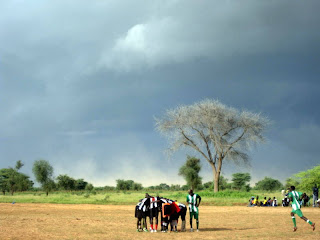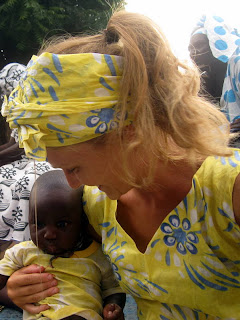I recently finished reading "When a Crocodile Eats the Sun," a memoir about Mugabe's decimation of Zimbabwe and the impact it has had on one native white family. In it, the narrator, Peter Godwin, makes this poignant avowal:
"I feel like weeping. Weeping at the way Africa does this to you. Just as you're about to dismiss it and walk away, it delivers something so tender. One minute you're scared shitless, the next you're choked with affection."
For some reason, I was immediately struck by this quotation, by its striking honesty and by my visceral awareness of its truth in my own life.
Unlike Godwin, I'm not living in a veritable warzone, forced to watch the country of my birth and rearing go from being "Africa's breadbasket" to "Africa's dustbowl." Senegal is a world away from Zimbabwe, and in most cases I'm eager to avoid generalization about a continent made up of 54 distinct countries and countless tribes, ethnicities, cultures, and languages.
But something about what Godwin had to say help specific resonance with my experience here, as far as the way that this place - Africa - can shuffle you between polar opposite emotional extremes from one moment to the next. I know that I frequently have to take pause -- literally, to stop what I am doing -- when I find myself experiencing that sudden shift from utter, abysmal frustration/fear/loneliness/anger to utter appreciation/love/wonder/affection for the moment and the place.
As I write this, by candlelight in my hut, exhausted from a frustrating day, some young men are clustered outside my room in the nearby village common area. They came together for an impromptu session of harmonious singing, accompanied by the rhythmic beating of plastic jerry cans (Which double as chairs and water containers during the day). The anxiety and aggravations of the long, hot day are melting away in the beauty of this juxtaposed tranquility.
As a simple matter of fact, the harshness of life here is constantly making its presence known, especially to a tender, under-prepared white girl from the first world, such as myself. I go days on end without ceasing to sweat. My skin - thankfully not quite as pale as that of some of my colleagues - still responds unfavorably to the relentless West African sun. I spend my days walking through sand mottled with various types of manure, and no less than one in five steps does the poor sole of my foot come crunching down on a thorn stuck in my flip-flop.
And then there are all the inveterate health problems. Few and far between are the days when we don't suffer from some sort of gastrointestinal issue, mysterious rash, or both. As my PC Volunteer Leader April put it, "Sometimes you just don't know what's going on with your body in this country."
And then -- well, and then there are the people. Specifically, there's the high-incidence of meddlesomeness, the unabashed and unending demands and constant needs, and the perpetual scrutiny that is directed at me, the toubab. Please understand that I mean it in the least ego-meniacal and self-interested way when I say that I have come to sympathize fiercely with celebrities. Everyone wants a piece of you, wants something from you -- your attention, your salutation, your money, an English lesson, a ticket to America, a US. visa, your bike, etc. Sometimes, I close my eyes and try to pretend I'm anonymous again, like if I can't see anyone, they can't see me -- like a baby playing peek-a-boo who thinks he becomes invisible when you cover his eyes.
Believe it or not, however, all this is not meant to be a senseless barrage of complaints. What I'm presenting above is a sampling of things that can get me thinking that I'm not cut out for a life in Africa, that make me wonder what the heck I'm doing here, that break down my resistances, sometimes to point of tears or tantrums or feelings of total despondency.
But alas, this is the crazy miracle of Africa: it is these same forces that bring me back to life. The same kids that make me want to run screaming can make me fall in love with their sincerity, their desire to talk and learn and help. An old man will infuriate me when he reprimands me for not greeting him, but then we get to talking and I realize what a spectacular thing it is to befriend this man, and that maybe I should have been more careful with my greeting after all. In the midst of a sweaty afternoon, a poor migrant laborer gives me a watermelon and refuses to let me pay him for it. The women have impromptu dance sessions at the women's group meeting. The kids are always dancing, too, for no ostensible reason. Some of them bang on metal bowls while the rest of them dance, and in this simple, creative fashion, they pass the time. Teenage boys chant late into the night. Women come together to cook for the whole village, on command. My four-year-old brother insists on giving me a full half of his handful of peanuts. Villager after villager forgives all my language blunders, excuses all my communication errors, likes me and respects me and takes care of me despite my general confusion and occasionally cranky disposition. I sleep under the beaming moon, pee under the stars, shower in the rain. Goats and sheep offer me consolation in bad moments; a cow's soft eyes lift my spirits on a morning run. And the terrain, generally dry and brown as could be, for three months out of the year pulls out all of the stops and blankets itself in a lively expanse of green. In unexpected and vivacious ways, Africa makes you smile out of nowhere.





































 If I look devilishly happy, I am -- Kimchee noodle tofu soup has that effect on me.
If I look devilishly happy, I am -- Kimchee noodle tofu soup has that effect on me. 


